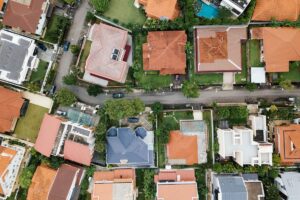Writer: Eleana Teran
 2 min read August 2022 — As Atlanta looks to close the homeownership gap and develop more affordable housing projects, local nonprofit Atlanta Neighborhood Development Partnership is leveraging millions in philanthropic funds to foster thousands of affordable housing units.
2 min read August 2022 — As Atlanta looks to close the homeownership gap and develop more affordable housing projects, local nonprofit Atlanta Neighborhood Development Partnership is leveraging millions in philanthropic funds to foster thousands of affordable housing units.
On Aug. 29, 2022, the Atlanta Neighborhood Development Partnership (ANDP) received a $500,000 grant from the James M. Cox Foundation. The grant was in support of ANDP’s Closing the Gap initiative, a plan to build or preserve 2,000 affordable apartments and homes by 2025 to meet more of the city and region’s housing needs. In addition to expanding affordable homeownership and rental housing opportunities, this donation will also provide the possibility to invest in small real-estate-focused businesses.
The “significant investment from the James M. Cox Foundation will help ANDP provide homeownership, related wealth building, and affordable rental opportunities at increased scale,” John O’Callaghan, president and CEO of ANDP, said in a statement shared with Focus:. ANDP is currently seeking to build or preserve 2,000 affordable apartments and homes by 2025, with more than 50% of the homes completed or in the pre-development phase.
James M. Cox Foundation’s donation brings the campaign’s total raised to nearly $13 million of the $18 million goal. “Philanthropic funds like these are leveraged 25:1 with other financing, impact capital, and highly competitive Federal program dollars,” said O’Callaghan, with the total cost of the 2,000-unit plan estimated to be $440 million.
Housing costs continue to rise for both owners and renters, according to Harvard’s Joint Center of Housing Studies. In March 2022 home prices increased 20.6% nationwide, surpassing the previous 20% increase in August 2021, making it the largest jump in three decades of recordkeeping. Adding to the pressure on prices, investors focused on markets with rapid appreciation, Atlanta drew the highest investor share of home sales in the fourth quarter of 2021 with 41%, followed by San Jose (38%), Phoenix (36%), and Las Vegas (36%).
With a home price-to-income ratio of 5.2 Atlanta ranks 30th among U.S. cities with the highest home price-to-income ratios. Similarly, as of June 2022, the Federal Reserve Bank of Atlanta lists the region among the 50 least affordable Metro Areas to live.
There is not enough supply of affordable rental homes for extremely low-income households in the state. Georgia has 39 affordable homes for every 100 households at or below the extremely low-income threshold (ELI). When considering the Atlanta Metro Area, available affordable units drop to 27. Up for Growth reports that before the pandemic, Atlanta had an underproduction of 97,538 homes and a 26.9 percentage point gap between Black and White homeownership. According to the latest figures, rents have increased 7.2% in comparison to last year, causing similar challenges for renters. In the metro area, 45.4% of renter households were cost-burdened, especially Latinx and Black families.
“A decade of underbuilding residential real estate and increased demand on multiple fronts has driven supply to record lows and rental rates and home prices to record highs. Metropolitan Atlanta, like many other metros across the country, must address the supply of housing – especially homes and apartments affordable to low- and moderate-income families,” said O’Callaghan. “Closing the homeownership gap between Black and white households – a gap nearly as large as it was when the Fair Housing Act was signed in 1968 – is critically important to creating equity and economic opportunity in communities of color, especially Black communities.”
Zoning rules make it particularly difficult to address the situation. In Atlanta, zoning allows for big apartment buildings downtown or single-family homes on big lots, resulting in a missing middle. Yes in my Backyard (YIMBY) advocates to update the zoning system to create more equitable and affordable housing opportunities. At the same time, organizations are looking to increase funding for subsidized affordable housing through a wide range of mechanisms.
“Metro Atlanta’s nonprofit developers have dramatically increased their capacity and need greater access to philanthropic support, impact investments, and enterprise capital to produce at a scale needed to address the crisis,” said O’Callaghan.
